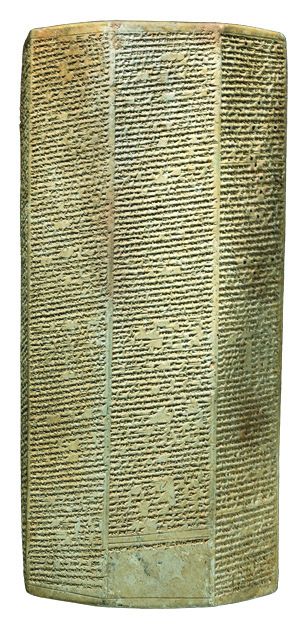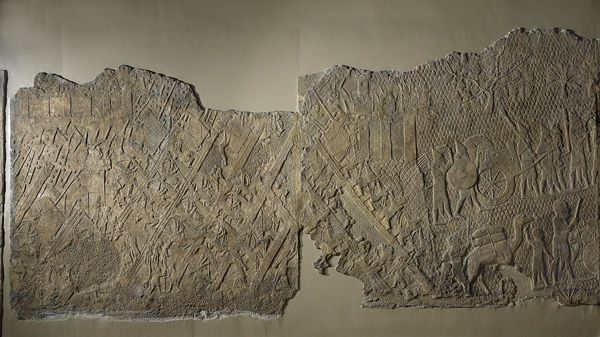
Left: Fig. 1. Annals of Sennacherib. Baked Clay. Assyria, Nineveh. Neo-Assyrian, 694 B.C. The Trustees of the British Museum, London (BM 103000)
Hezekiah became king of Judah in ca. 727 B.C. We learn from the Bible that he purified and repaired the Temple, purged its idols, reformed the priesthood, and witnessed the land prosper. But events in far-off Assyria were to have a fateful effect upon his kingdom. When Sargon II, the king of Assyria, died in battle in 705 B.C., states, including Judah, that were subject to Assyrian hegemony saw the opportunity for revolt (2 Kings 18:7). In 703 B.C. Sennacherib, Sargon's son and successor, began a series of major campaigns to quash opposition to Assyrian rule. Turning first to Babylon in 703, he defeated Marduk-apla-iddina II (biblical Merodach-baladan, Isa. 39:1), the anti-Assyrian king of Babylon, and placed a puppet ruler on the throne. In the next year Sennacherib marched eastward into the Zagros Mountains, defeated enemy forces, and took tribute from distant lands and peoples. In 701 B.C. the king turned toward rebellions in the west. With Phoenicia attacked first, Sidon fell and its king fled across the sea. Soon other cities and kingdoms submitted. Ammon, Moab, Edom, and others offered gifts and kissed the feet of the Assyrian monarch. When the Philistine city of Ashkelon succumbed, Sennacherib removed the king, his wife, sons, daughters, brothers, and kin, and exiled them back to Assyria. Turning to the east, Sennacherib overwhelmed Philistine Ekron and suspended the bodies of its rebellious leaders on stakes throughout the city. Sennacherib's annals also record that the former king Padi, a pro-Assyrian vassal who had been expelled by his own people and held captive by Hezekiah, was returned to his throne in exchange for payment in recognition of Sennacherib's overlordship.
Hezekiah was now caught in a quandary. The threat of Jerusalem's destruction before the relentless march of the Assyrian army was real, but the Egyptians had offered help. According to the biblical account Hezekiah relied on the advice of the prophet Isaiah (38:5–7), who urged the king to believe in the power of divine protection. He rebelled, trusting in the Egyptian offer of support, but when the Egyptian army with its Nubian chariotry was defeated in battle, Hezekiah faced certain doom. Knowing that Jerusalem would eventually be subject to siege, he had been preparing for war for some time by fortifying the walls of Jerusalem, building towers, and constructing a tunnel to bring fresh water to the city from a spring outside its walls (Isa. 22:11; 2 Kings 20:20; 2 Chr. 32:2–5).
Sennacherib, now unhampered by any major opposing army, began his march against Judah and Jerusalem (as recorded in his own royal annals and in the Bible [2 Kings 18:13–15; Isa. 36:1]). The Assyrian advance had been predicted by Isaiah (1:1), who blamed the impending disaster on a lack of trust in God. "Again the Lord spoke to me, thus: 'Because that people has spurned the gently flowing waters of 'Siloam' (a reference to the God of Zion)—Assuredly, My Lord will bring up against them the mighty, massive waters of the Euphrates, The king of Assyria and all his multitude. It shall rise above all its channels, and flow over all its beds, and swirl through Judah like a flash flood reaching up to the neck'" (Isa. 8:5–8). In an Assyrian royal inscription included in the Assyria to Iberia exhibition (fig. 1), Sennacherib confirmed the prophet's prediction, boasting that he "surrounded (and) conquered forty-six of his (i.e., Hezekiah's) fortified cities, fortresses, and small(er) settlements in their environs, which were without number, by having ramps trodden down and battering rams brought up, the assault of foot soldiers, sapping, breaching, and siege engines. I brought out of them 200,150 people, young (and) old, male and female, horses, mules, donkeys, camels, oxen, and sheep and goats, which were without number, and I counted (them) as booty." This Assyrian account recorded by Sennacherib's scribes in 694 B.C., ten years after his Judean campaign, may also be reflected in the lament of the prophet Micah's description (1:9–16) of the disaster that befell towns of Judah.
At this point Hezekiah, knowing that the Assyrian king had reached Lachish (2 Chr. 32:9), the largest fortified citadel in Judah after Jerusalem, and knowing that the Assyrians preferred to accept an annual payment of tribute rather than destroy a city and enjoy a one-time infusion of wealth, sent a message of appeasement to Sennacherib.
"I have done wrong; withdraw from me; and I shall bear whatever you impose on me." So the king of Assyria imposed upon King Hezekiah of Judah a payment of three hundred talents of silver and thirty talents of gold. Hezekiah gave him all the silver that was on hand in the House of the Lord and in the treasuries of the palace. At that time Hezekiah cut down the doors and the doorposts of the Temple of the Lord, which King Hezekiah had overlaid [with gold], and gave them to the king of Assyria (2 Kings 18:14–16).
It is not known why Hezekiah's tribute did not succeed in preventing further attacks. The Assyrians bore down on Lachish, battered down its walls, slaughtered thousands of its inhabitants, and impaled the bodies of its leaders on stakes outside of the city walls.

Fig. 2. Relief showing Sennacherib's siege of Lachish. Gypsum alabaster. Assyria, Nineveh, Southwest Palace. Neo-Assyrian, 700–692 B.C. The Trustees of the British Museum, London (ME 124906, 124907)
Jerusalem lay only 30 miles away. In advance of his forces, Sennacherib dispatched a delegation of high-level military and administrative officials to negotiate terms of surrender and remind Hezekiah that Egypt had been defeated and Judah's god would be of no help against the might of the "Great King of Assyria." Undoubtedly the negotiations broke down possibly in part as a result of Hezekiah's reliance on the words of Isaiah, who assured the king once again that God would protect Jerusalem and crush the Assyrian army (2 Kings 19; Isa. 14:24–27). The Assyrian army then advanced, surrounding the city. "As for him (Hezekiah), I confined him inside the city Jerusalem, his royal city, like a bird in a cage. I set up blockades against him and made him dread exiting his city gate." Jerusalem would surely fall and Sennacherib claimed that he made Hezekiah "submit at my feet," but, according to the Bible, during the night "an angel of the Lord went out and struck down one hundred and eighty-five thousand in the Assyrian camp, and the following morning they were all dead corpses. So King Sennacherib of Assyria broke camp and retreated" (2 Kings 19:35–36; Isa 37:33–35).
What actually happened that night is not clear. The Assyrian account reveals that Babylonian rebellion had broken out anew (the account of the following year is primarily concerned with campaigning in Babylonia, and with the continued pursuit of Marduk-apla-iddina, the same rebellious king whom Sennacherib had defeated in his first campaign), which may have caused Sennacherib to lift his siege prematurely, but not before the king exacted an enormous and humiliating annual payment of tribute:
"As for him, Hezekiah, fear of my lordly brilliance overwhelmed him and, after my (departure), he had the auxiliary forces (and) his elite troops whom he had brought inside to strengthen the city Jerusalem, his royal city, and who had provided support, (along with) 30 talents of gold, 800 talents of silver, choice antimony, large blocks of . . . ivory beds, armchairs of ivory, elephant hide(s), elephant ivory, ebony, boxwood, garments with multi-colored trim, linen garments, blue-purple wool, red-purple wool, utensils of bronze, iron, copper, tin (and) iron, chariots, shields, lances, armor, iron belt-daggers, bows and ussu-arrows, equipment, (and) implements of war, (all of which were without number, together with his daughters, his palace women, male singers, (and) female singers brought into Nineveh, my capital city, and he sent a mounted messenger of his to me to deliver (this) payment and to do obeisance."
Jerusalem survived and Sennacherib never returned to fight again in the west. In 681 B.C., according to several Mesopotamian documents, the king was assassinated by his son Arda-Mulishshi (cf. 2 Kings 19:37; 2 Chr. 32:21, where the murder is also recorded).